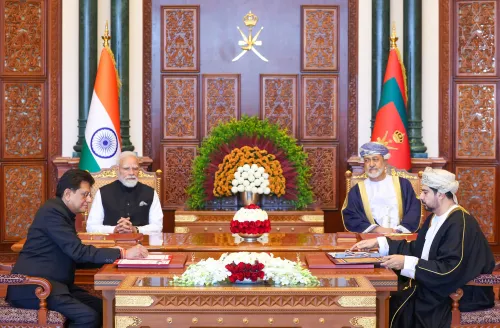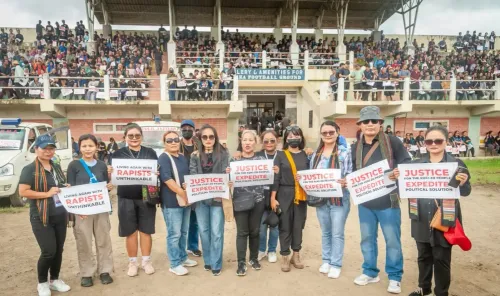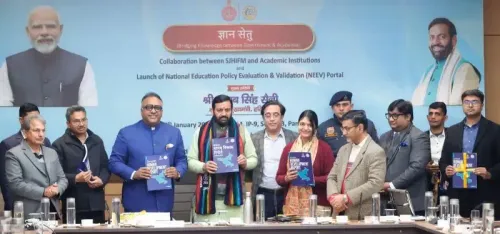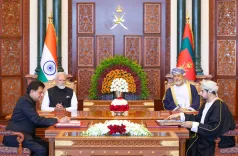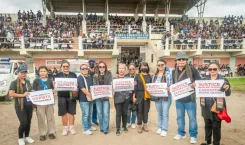Pope Francis: A Pontiff for the People, Dedicated to Peace and Understanding
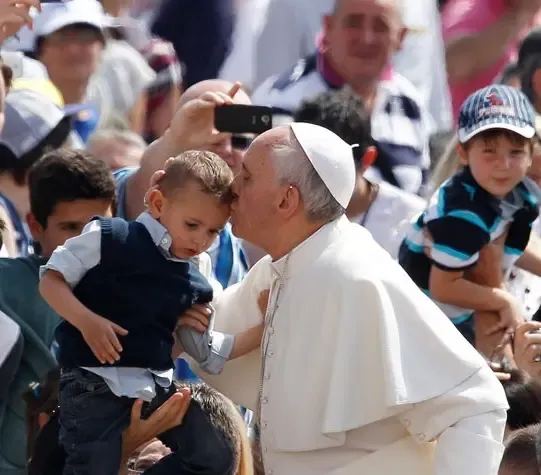
Synopsis
Key Takeaways
- Pope Francis is the first Pope from the Americas.
- He chose the name of St Francis of Assisi to embody his vision.
- His papacy focused on social justice and compassion for the poor.
- He emphasized the importance of interfaith dialogue.
- Pope Francis advocated for the decriminalization of homosexuality.
New Delhi, April 21 (NationPress) The first Pope hailing from the Americas and a member of the Jesuit order, Cardinal Archbishop Jorge Mario Bergoglio's selection of St Francis of Assisi as his papal name reflects his vision and mission to rejuvenate the Catholic Church while advocating for peace and justice globally.
Despite his own order having a saint - St Francis Xavier, Pope Francis (1936-2025) opted for the name of the Saint of Assisi, who is revered even outside of his faith for his rejection of material wealth, emphasis on compassion for the vulnerable, environmental protection, and founding a religious order that prioritizes poverty, peace, and charity. Notably, St Francis of Assisi was the favorite Christian saint of Mahatma Gandhi.
Born in Buenos Aires to an Italian family that fled Benito Mussolini's fascist regime, Pope Francis had a typical primary education before enrolling in a technical secondary school where he earned a diploma as a chemical technician. After working as a bouncer and janitor, he spent time in a laboratory’s food section before he felt drawn to religion following a serious illness in his early 20s.
After studying at a seminary, he entered the Society of Jesus as a novice in March 1958, was officially recognized as a Jesuit in March 1960, and after further study and teaching, took his final vows in April 1973.
He steadily advanced through the church hierarchy, serving as Auxiliary Bishop of Buenos Aires in 1992, becoming coadjutor Archbishop in 1997, and then Archbishop in 1998 - a role he maintained until his papacy, despite being appointed Cardinal by Pope John Paul II in 2001. As Archbishop, he founded new parishes, created a commission on divorces, and worked to enhance the church's outreach in Buenos Aires' slums.
He set a personal example by residing in a modest apartment instead of the bishop's opulent residence, utilizing public transportation, and preparing his own meals.
Becoming the 266th Pope following the unexpected resignation of Benedict XVI (2005-13), Pope Francis had already been a frontrunner in the 2005 conclave to elect Pope John Paul II's successor, making him the most recognized Argentine since Juan and Eva Peron, Ernesto ‘Che’ Guevara, Diego Maradona, and Gabriela Sabatini.
This recognition stemmed from his humility, openness, emphasis on mercy, concern for the poor and social justice, advocacy for interfaith dialogue, and a perceived liberal stance despite doctrinal conservatism.
As the leader of the Catholic Church, Pope Francis integrated women as full members of various dicasteries (departments) in the Vatican, advocated for greater empathy towards LGBTQ community members, and expressed that while same-sex unions could not receive blessings, individuals could be blessed in a non-liturgical context.
He also urged for decentralization of church governance away from the Vatican, promoting decision-making in consultation with the populace.
In alignment with his 13th-century namesake, he criticized unrestrained capitalism, consumerism, and unchecked progress, while highlighting love and charity. He actively called for action on climate change, labeled the death penalty as “evil,” and voiced commitment to its abolition, promoted the decriminalization of homosexuality, denounced the rise of right-wing populism, and championed the plight of refugees, declaring their protection a “duty of civilization.”
He was instrumental in restoring full diplomatic relations between the United States and Cuba and brokered an agreement with China to clarify the Communist Party's influence over the appointment of bishops in China.
Pope Francis was also proactive in interfaith dialogue. In May 2014, he visited Israel and the Palestinian territories, extending symbolic gestures to both sides and engaging with senior Islamic and Jewish leaders.
In February 2019, he traveled to Abu Dhabi, becoming the first pope to celebrate Mass on the Arabian Peninsula. He visited Iraq in 2021 and met with Grand Ayatollah Ali al-Sistani.
The Pope also attempted to facilitate peace talks between Russia and Ukraine, albeit unsuccessfully.
In his final Easter Sunday message, which would be his last public appearance, his address “Urbi et Orbi” (to the city and the world) called for global peace, disarmament, and the release of prisoners.
He reiterated calls for an immediate ceasefire in the Gaza Strip, the release of hostages, and access to humanitarian aid, urging nations to dismantle physical, political, economic, and spiritual barriers that divide society.
He implored nations to allocate their resources towards combating hunger, fostering development, and caring for one another rather than for rearmament.
“The principle of humanity never fails to be the hallmark of our daily actions,” the Pope remarked, words that could serve as his epitaph.
(Vikas Datta can be reached at vikas.d@ians.in)



